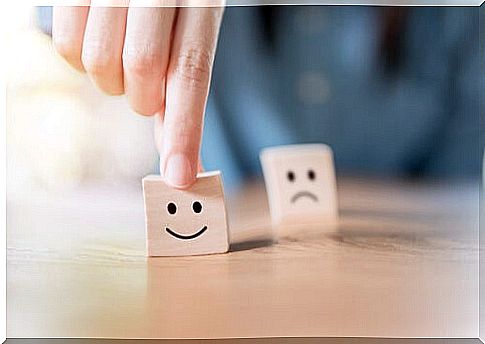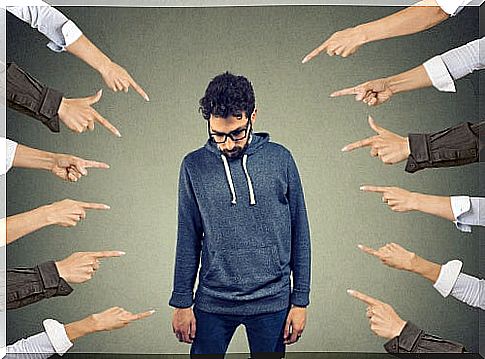People Who Compare Us With Others, Why Do They Do It?

There is a very widespread bad habit. In fact, it is common to suffer it almost from childhood, a place where our parents may compare us with others, highlighting what others achieve and we do not. Also in adulthood, comparisons are common by people who, with good or bad faith, highlight what others do or have and what, according to them, we lack.
Daring to be different seems to be little more than a challenge in a society that enforces the normative. What’s more, sometimes we don’t even seek to make a difference from others; but it is enough to get a little out of what for many is “socially expected” for someone to point a finger at us instantly.
Nobody is like another. Neither better nor worse, it is another; and comparisons are odious, said Jean Paul-Sartre. However, the human being has as a weak point comparing and comparing others. It seems almost a vice, a very contagious obsession that undermines personal growth and destroys identities.
Because who compares us with others, and most of us will have experienced this at some time, does not do it to praise what makes us unique and special; It does so to highlight what we lack, what fails or is not normative.
Comparison is a poison for self-esteem. It is especially so if we exercise it ourselves, if we have a bad habit of looking at our environment to give ourselves value. Now, just as harmful is that others do it, that it is our family or our partner who likes to distort our image, potential or character when comparing ourselves with others.

People who compare us to others: reasons why they do it
The theory of social comparison, enunciated by the social psychologist Leon Festinger in 1954, points out something interesting. When a person runs out of obvious clues about their effectiveness, worth, or characteristics, they turn their attention to those around them. In this way, it obtains a reference to itself to make an assessment. Thus, and in some way, the human being seeks to define himself also taking the rest as a reference.
We know this is a constant source of frustration. However, why are there those who compare us to others? Let’s put some examples on this topic. Imagine a mother who always compares her two daughters. It reminds the youngest, almost every day, that at the same age, the older sister already had a good job, a stable partner and the first child.
Likewise, and as if that were not enough, this same girl suffers the weight of the comparisons on the part of her partner. This indicates that she is almost as insecure as a co-worker of hers or that she physically looks more and more like one of her cousins. Something like this undoubtedly has a determining effect on this young woman’s self-esteem. These types of verbalizations undermine and create insecurities and even complexes.
As Confuncio said, complexes come as passengers. At first they are mere guests but in the end they remain as true masters. And if it is also others who reinforce and feed them on a daily basis, the consequences can be very exhausting. Let’s see why they do it, why there are people who compare us with others.

Lack of Emotional Intelligence
Those who compare us with others have, above all, a low Emotional Intelligence. We must be very clear about this aspect so as not to be overwhelmed by this common practice. Thus, those people who resort with such agility to the use of comparisons lack that empathy with which to understand that each being is unique, exceptional in character, essence, presence and values.
If they do not understand this reality, they do not connect with us, there is no respect, they are not able to put themselves in our place. Also, another principle of Emotional Intelligence is correct communication. Within this approach, something that is always taken into account is that the use of comparisons is not valid and even less helpful.
If we want to draw attention to a person about something related to their behavior, we will tell them about their behavior without referring to third parties.
- An example, we cannot say to a child “ you are as clumsy in math as your brother Pablo, neither of you have a remedy” . Instead of using this statement, the correct thing to do would be to say “I see that you have problems in math, but I think that if you try a little effort and ask what you do not understand, you will have overcome it.”
People who do not value what they have
People who compare us to others possibly do not appreciate what they have. It is done by parents who think that the children of others are more diligent. It is done by that person who does not appreciate his partner as he deserves. Furthermore, we also do not value ourselves when we compare ourselves to others.
Thus, in a study published in the Journal of Personality and Social Psychology, by doctors Sebastian Deri and Shai Davidai, they indicate that those who have the bad habit of comparing themselves or their close ones with third parties, do not appreciate who they are and What they have. Their pessimistic and nonconformist bias means that they never stop appreciating their loved ones for who they are.
And something like that is highly problematic.

People who compare us to others make use of emotional manipulation
Last but not least, we have a third option. Those who compare us with others may also have other reasons, which are none other than manipulating us and undermining our self-esteem. In fact, it’s a common tactic for those who want to be in control, because constant comparison is an exercise in humiliation and belittling.
To conclude, as we can see, those people who compare us with others lack those basic tools of sociability, respect and empathy. Let’s avoid empowering them, don’t allow these behaviors and always defend our individuality. Being unique, different and singular is our best value.









